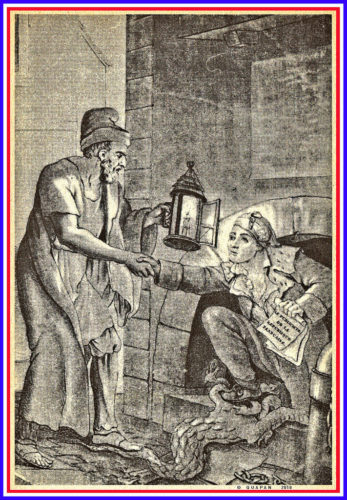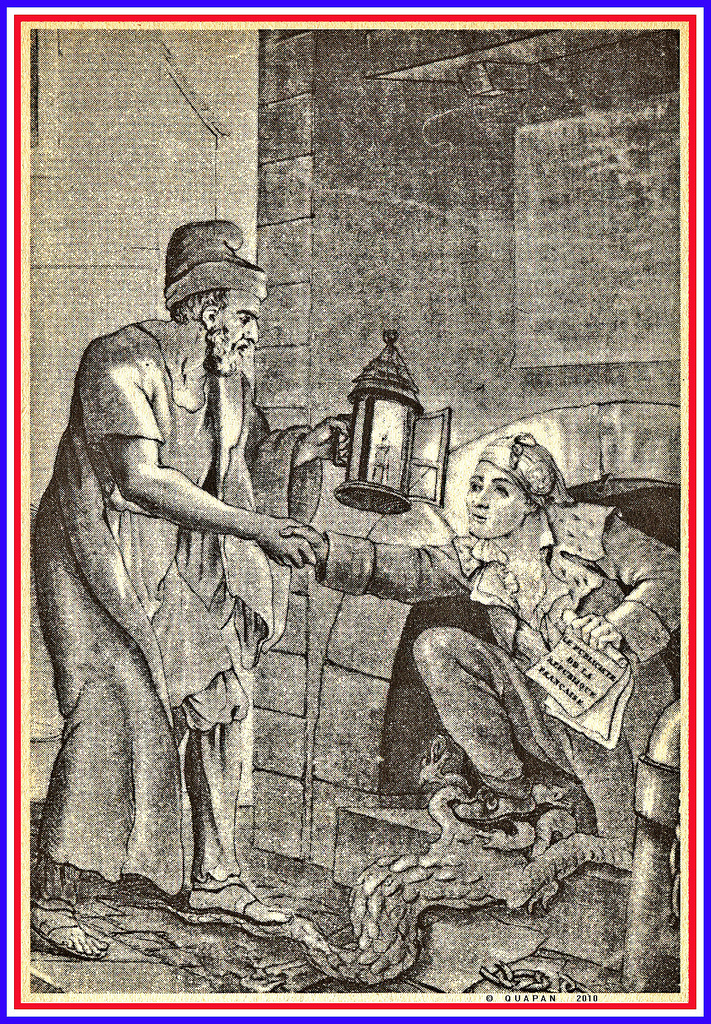Ever notice how, when you catch some sort of mental insight, all of its profundity dissolves into wet cotton candy when you try to render it in words? Keep that in mind as you read the following; I know that what I’m about to explain sounds both clunky and obvious to many, and my only excuse is that it sounded a lot better in my head.
 The insight to which I refer is a logical fallacy which I suddenly recognized to be at the unspoken root of many spoken assertions in politics, religion, etc. — basically, any topic of discussion in which facts are bolstered by strong emotion. Given where I sit on the political spectrum, I of course want to say that this fallacy is mostly exercised by those on the Left, and I still believe that it is much more commonly part of the rhetorical toolbox of Progressives or Social Justice Warriors, but I don’t deny that many on the Right, or any other direction to want to attach to the arbitrarily bi-direction political continuum, fall back on it; it is a crutch and a fallacy, but it’s damnably useful.
The insight to which I refer is a logical fallacy which I suddenly recognized to be at the unspoken root of many spoken assertions in politics, religion, etc. — basically, any topic of discussion in which facts are bolstered by strong emotion. Given where I sit on the political spectrum, I of course want to say that this fallacy is mostly exercised by those on the Left, and I still believe that it is much more commonly part of the rhetorical toolbox of Progressives or Social Justice Warriors, but I don’t deny that many on the Right, or any other direction to want to attach to the arbitrarily bi-direction political continuum, fall back on it; it is a crutch and a fallacy, but it’s damnably useful.
The fallacy is this, restated in many ways to indicate the breadth of its application:
Pain confers insight.
Loss is morally unassailable
There is no honorable argument against distress and injury.
Deprivation is a sign of wisdom.
Victimhood guarantees the moral high ground.
(Note: After writing the above and searching for variant ways to express the same concept, I realized that I may have borrowed this insight in its totality from this blog post by J. Max Wilson. Nevertheless, as I want to elaborate the concept as it has been rattling around in my head, this parenthetical note will be my only admission that the whole idea didn’t spring fully formed from my own noodle.)
Please understand that I am not saying that one cannot gain wisdom or insight from adversity, but that on does not necessarily gain such. The assumption that such moral clarity is unavoidably gained is at the root of many strong assertions in religion, politics, and generally anything that isn’t measured with a ruler (and sometimes even there).
We see this unspoken concept behind entirely un-self-conscious claims that Cindy Sheehan (remember her?) had “absolute moral authority” because of her status as the mother of a fallen soldier.
We see this in the idea that interviewing people subsisting on a minimum-wage income gives necessary insight to the economic wisdom of increasing the minimum wage.
 We see this in the unspoken assumption that a speaker who is part of a “protected class” of minority has, by virtue of that membership (whether or not said individual has experienced any of the ill treatment which has afforded that particular group its “protected class” status), a more legitimate insight into macro-social ills and remedies than an individual who does not have that “protected class” certification; indeed, the views of the second individual can be haughtily dismissed by a single word: “privilege.”
We see this in the unspoken assumption that a speaker who is part of a “protected class” of minority has, by virtue of that membership (whether or not said individual has experienced any of the ill treatment which has afforded that particular group its “protected class” status), a more legitimate insight into macro-social ills and remedies than an individual who does not have that “protected class” certification; indeed, the views of the second individual can be haughtily dismissed by a single word: “privilege.”
We see this in Kate Kelly’s attempts to “shame” the LDS Church into ordaining women to the priesthood by trumpeting the pain some women express at not being ordained.
Heck, we’ve seen the “mystical minority” so often in movies — be it the Indian with wisdom beyond the bounds of his trailer home, the black person whose instinctive grasp of what is true and good and right is obviously inherited from his great-great-grandfather in slavery, or even the homeless man who is something of a street-corner prophet — that it’s become a cliche, known as the “Super Duper Magical Negro.”
We see it in the people who seek to inflate their victimhood cred, whether by declarations of “privilege” or “rape culture” or “micro-aggressions” or “trigger warnings” or whatever the neologism-du-jour is, based on the implicit understanding that if one can document being hurt, one is given greater moral authority in the discussion of the situation.
In all cases, the assumption — never stated, rarely even consciously formulated — is that the person who has experienced pain, deprivation or loss is obviously endowed with a higher grasp of morals or ethics pertaining to the situation, and thus how to rectify the situation (with the fact that pain has been caused as prima facie evidence that Something Must Be Done).
Such an uncommon assumption must be met with a conscious, deliberate refutation:
Pain, hurt, loss or deprivation does not in itself confer greater understanding, clarity, or moral wisdom.
A man with an intestinal pain does not, simply by virtue of that pain, have a greater capacity for diagnosis of the cause of that pain than a medical professional, despite the fact that the medical professional is not the one in pain. (Remember when I said that I wouldn’t refer back to J. Max’s blog post? I guess I lied. Privilege!)
 An individual who perceives inequity against him/herself where said person seeks diligently to find said inequity is not, simply by virtue of having perceived that inequity, the best witness or source of information on the nature of any such inequity.
An individual who perceives inequity against him/herself where said person seeks diligently to find said inequity is not, simply by virtue of having perceived that inequity, the best witness or source of information on the nature of any such inequity.
The status of an individual as a racial or ethnic minority (provided that said minority is acknowledged as being a designated underprivileged group; Asian-Americans need not apply) does not confer a clearer understanding of the nature of racial politics than possessed by an individual who has been labeled as possessing “privilege.”
Things I am not saying: That pain “doesn’t matter,” that we should not seek to minimize pain, that pain cannot lead to greater understanding. I am saying that if pain does lead to greater understanding, it must be demonstrated by evidence of that understanding, not of the pain itself.
Fair warning: If you attempt to interject this conscious corrective into a conversation (excuse me, a “dialogue”) informed by the unconscious concept delineated above, you will be labeled as “racist,” “sexist,” or a generic “h8r.” These will not be backed up with any evidence or reasoning; it will not be considered any less valid for all of that by those who use such labels.
